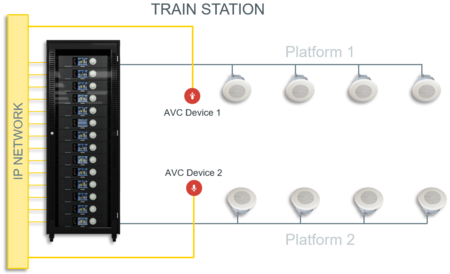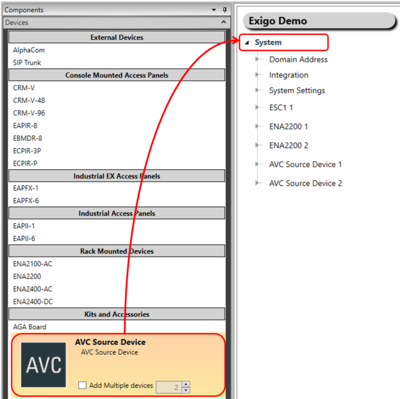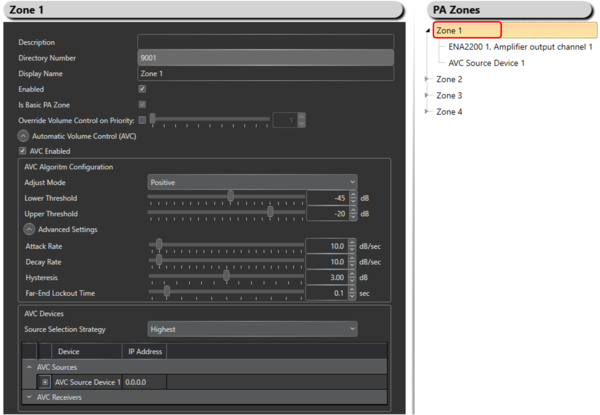Difference between revisions of "Automatic Volume Control (AVC) Configuration"
| (25 intermediate revisions by the same user not shown) | |||
| Line 1: | Line 1: | ||
| − | [[File:AVC example.PNG|thumb|right| | + | [[File:AVC example.PNG|thumb|right|450px|Automatic Volume Control - example]] |
This article will explain the principle on how to setup and configure Automatic Gain Control (AGC) in Exigo. | This article will explain the principle on how to setup and configure Automatic Gain Control (AGC) in Exigo. | ||
| − | == Step 1: Add AVC Device To The System == | + | == Step 1: Add AVC Source Device To The System == |
| − | To add an AVC | + | To add an [[EINS-1| AVC Source Device]] to the system: |
#In '''Components''' view, open '''Devices'''. | #In '''Components''' view, open '''Devices'''. | ||
| − | #In '''Kits and Accessories''' locate '''AVC Device'''. | + | #In '''Kits and Accessories''' locate '''AVC Source Device'''. |
| − | #Drag and drop '''AVC Device''' to '''System''' in the device tree. | + | #Drag and drop '''AVC Source Device''' to '''System''' in the device tree. |
| − | [[File:AVC config 1.PNG|left|thumb|400px|Add AVC | + | [[File:AVC config 1.PNG|left|thumb|400px|Add AVC Source Device to the system]] |
<br style="clear:both;" /> | <br style="clear:both;" /> | ||
| − | == Step 2: Add the AVC Device To The Zone == | + | == Step 2: Add the AVC Source Device To The Zone == |
| − | To add the AVC | + | To add the AVC Source Device to the zone: |
| − | #Locate the desired '''AVC Device''' in the device tree. | + | #Locate the desired '''AVC Source Device''' in the device tree. |
| − | #Drag and drop the '''AVC Device''' to the '''Zone'''. | + | #Drag and drop the '''AVC Source Device''' to the '''Zone'''. |
| − | [[File:AVC config 2.PNG|left|thumb|600px|Add AVC | + | [[File:AVC config 2.PNG|left|thumb|600px|Add AVC Source Device to the zone]] |
<br style="clear:both;" /> | <br style="clear:both;" /> | ||
| − | == Step 3: Adjust the settings for the AVC Device(s) == | + | == Step 3: Adjust the settings for the AVC Source Device(s) == |
To adjust the settings for the AVC device(s) in a zone: | To adjust the settings for the AVC device(s) in a zone: | ||
#Go to the designated '''Zone''' (top level). | #Go to the designated '''Zone''' (top level). | ||
| Line 30: | Line 30: | ||
== Parameter Details == | == Parameter Details == | ||
| − | '''AVC Enabled:''' Enable/Disable the AVC | + | '''AVC Enabled:''' Enable/Disable the Automatic Volume Control (AVC). |
'''Adjust Mode:''' Positive or Negative mode. | '''Adjust Mode:''' Positive or Negative mode. | ||
| − | ::'''Positive:''' Gain adjustment is from zero at AVC threshold and adjusted positive. Audio | + | ::'''Positive:''' Gain adjustment is from zero at AVC threshold and adjusted positive. Audio Receiver should have a low base gain. |
| − | ::'''Negative:''' Gain adjustment is from zero at AVC max level and adjusted with negative gain downwards. Audio | + | ::'''Negative:''' Gain adjustment is from zero at AVC max level and adjusted with negative gain downwards. Audio Receiver should have a high base gain. |
| − | ''' | + | '''Lower Threshold:''' Mic signal level where AVC start to work. Below this level no adjustment is done, and AVC Receiver should work on default base gain. <br> |
| + | ::Default value at -45 dB is empirically measured using default mic sensitivity 5, and target ambient audio SPL level at 65 dBA. | ||
::'''Example:''' Threshold = -40 dB | ::'''Example:''' Threshold = -40 dB | ||
::When AVC Device measurement < -40 dB: No AVC adjustment | ::When AVC Device measurement < -40 dB: No AVC adjustment | ||
::When AVC Device measurement > -40 dB: AVB adjust gain on Players 1 dB per dB above threshold | ::When AVC Device measurement > -40 dB: AVB adjust gain on Players 1 dB per dB above threshold | ||
| + | |||
| + | '''Upper Threshold:''' Mic signal level where AVC stops to work. Abowe this level no adjustment is done. | ||
| + | ::The difference between upper and lower threshold also defines the working range for AVC gain adjustments. <br> | ||
| + | ::In negative AVC mode this also defines the ambient level where configured base output gain is reached (offset adjustment is zero). | ||
== Advanced Settings == | == Advanced Settings == | ||
| Line 50: | Line 55: | ||
'''Far-End Lockout Time (sec):''' When playing audio in AVC Zone (far-end-signal) all AVC adjustments is locked. When far-end-signal ends, adjustments commences after this lockout-time. Lower values allows more adjustments in pauses of signal played. | '''Far-End Lockout Time (sec):''' When playing audio in AVC Zone (far-end-signal) all AVC adjustments is locked. When far-end-signal ends, adjustments commences after this lockout-time. Lower values allows more adjustments in pauses of signal played. | ||
| + | |||
| + | == AVC Devices == | ||
| + | '''Source Selection Strategy:''' The AVC Receiver will receive ambient audio levels or Gain adjust values from a number of AVC Sources. This configures the selection strategy for final gain adjusts on AVC Receiver. | ||
| + | ::The different settings are: '''Highest, Average, Average Mid'''. Average and Average Mid require at least four AVC devices. | ||
== IP reliant configuration == | == IP reliant configuration == | ||
| Line 59: | Line 68: | ||
::'''B) Manually enter IP:''' | ::'''B) Manually enter IP:''' | ||
::Also possible to manually enter the IP of each device in the AVC configuration | ::Also possible to manually enter the IP of each device in the AVC configuration | ||
| + | |||
| + | == IP Speaker as AVC Device == | ||
| + | By connecting an microphone to the IP Speaker it is possible to use it as an AVC Device. <br> | ||
| + | More information [[Using IP Speaker as AVC Device | here]]. | ||
== Availability == | == Availability == | ||
| − | + | A technical preview is available in Exigo 1.3.3.1. <br> | |
| − | + | Official release is available from Exigo 1.4 and newer. | |
[[Category:Getting started]] | [[Category:Getting started]] | ||
Latest revision as of 15:53, 26 June 2019
This article will explain the principle on how to setup and configure Automatic Gain Control (AGC) in Exigo.
Contents
Step 1: Add AVC Source Device To The System
To add an AVC Source Device to the system:
- In Components view, open Devices.
- In Kits and Accessories locate AVC Source Device.
- Drag and drop AVC Source Device to System in the device tree.
Step 2: Add the AVC Source Device To The Zone
To add the AVC Source Device to the zone:
- Locate the desired AVC Source Device in the device tree.
- Drag and drop the AVC Source Device to the Zone.
Step 3: Adjust the settings for the AVC Source Device(s)
To adjust the settings for the AVC device(s) in a zone:
- Go to the designated Zone (top level).
- Do the necessary settings.
Parameter Details
AVC Enabled: Enable/Disable the Automatic Volume Control (AVC).
Adjust Mode: Positive or Negative mode.
- Positive: Gain adjustment is from zero at AVC threshold and adjusted positive. Audio Receiver should have a low base gain.
- Negative: Gain adjustment is from zero at AVC max level and adjusted with negative gain downwards. Audio Receiver should have a high base gain.
Lower Threshold: Mic signal level where AVC start to work. Below this level no adjustment is done, and AVC Receiver should work on default base gain.
- Default value at -45 dB is empirically measured using default mic sensitivity 5, and target ambient audio SPL level at 65 dBA.
- Example: Threshold = -40 dB
- When AVC Device measurement < -40 dB: No AVC adjustment
- When AVC Device measurement > -40 dB: AVB adjust gain on Players 1 dB per dB above threshold
Upper Threshold: Mic signal level where AVC stops to work. Abowe this level no adjustment is done.
- The difference between upper and lower threshold also defines the working range for AVC gain adjustments.
- In negative AVC mode this also defines the ambient level where configured base output gain is reached (offset adjustment is zero).
- The difference between upper and lower threshold also defines the working range for AVC gain adjustments.
Advanced Settings
Attack Rate (dB/sec): This determines how quickly the AVC adjusts gain on raising ambient audio level.
Decay Rate (dB/sec): This determines how quickly the AVC adjusts gain on falling ambient audio level.
Hysteresis (dB): Hysteresis around previous set ambient audio level before doing adjustments.
Far-End Lockout Time (sec): When playing audio in AVC Zone (far-end-signal) all AVC adjustments is locked. When far-end-signal ends, adjustments commences after this lockout-time. Lower values allows more adjustments in pauses of signal played.
AVC Devices
Source Selection Strategy: The AVC Receiver will receive ambient audio levels or Gain adjust values from a number of AVC Sources. This configures the selection strategy for final gain adjusts on AVC Receiver.
- The different settings are: Highest, Average, Average Mid. Average and Average Mid require at least four AVC devices.
IP reliant configuration
AVC is reliant on the IP of each device to be able to work. This requires that the IP of each device is configured in EMT. This is done by:
- A) GET from controller:
- When performing a GET from the controller, the IP of all endpoints is written to the database and automatically entered in the AVC configuration
- B) Manually enter IP:
- Also possible to manually enter the IP of each device in the AVC configuration
IP Speaker as AVC Device
By connecting an microphone to the IP Speaker it is possible to use it as an AVC Device.
More information here.
Availability
A technical preview is available in Exigo 1.3.3.1.
Official release is available from Exigo 1.4 and newer.



